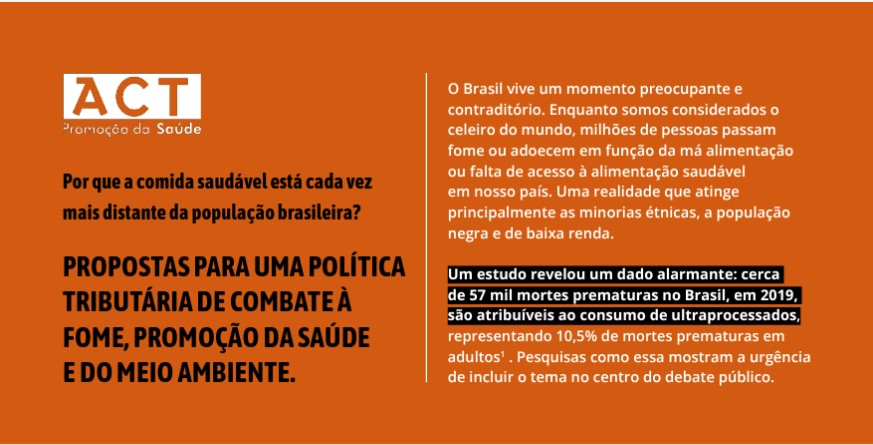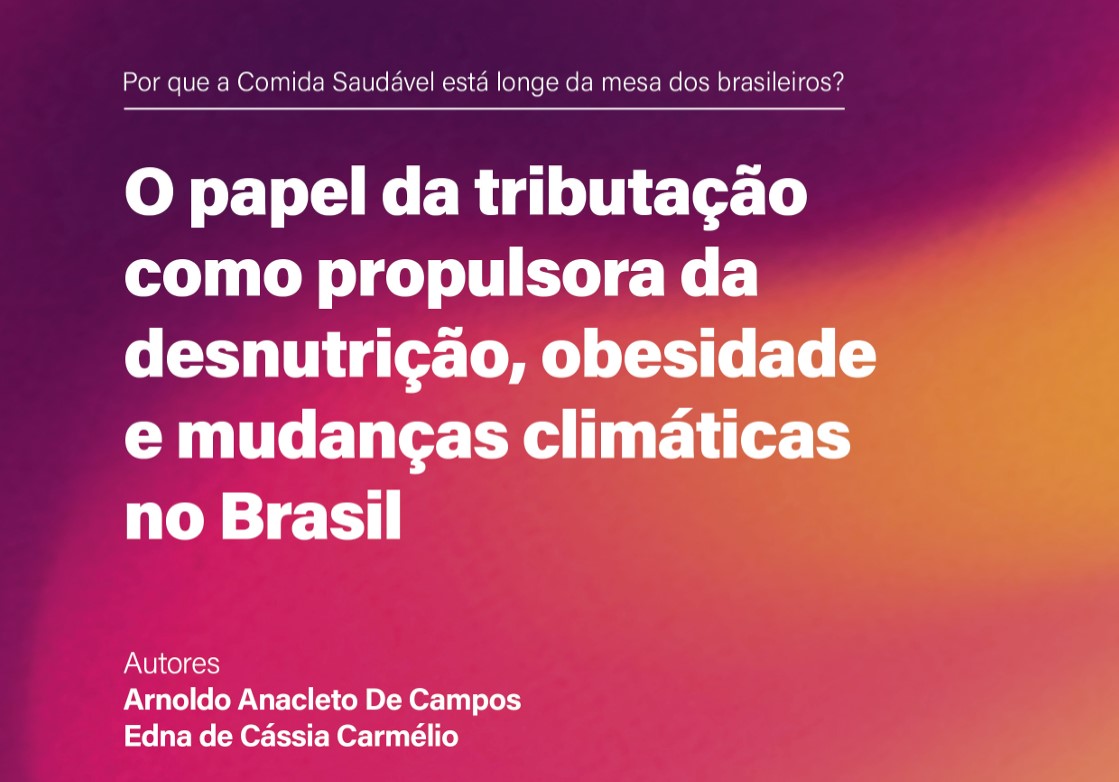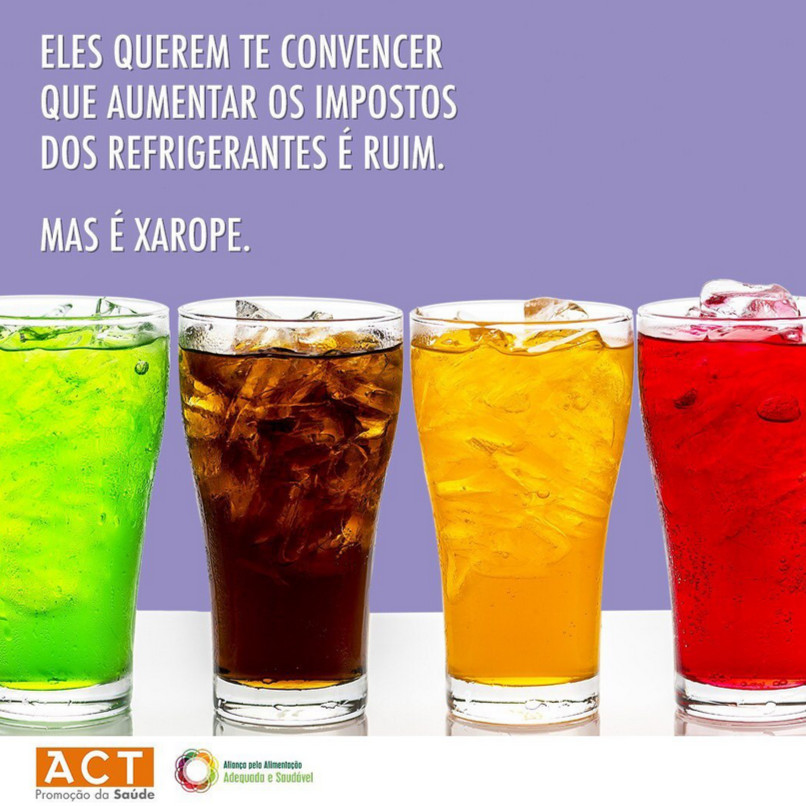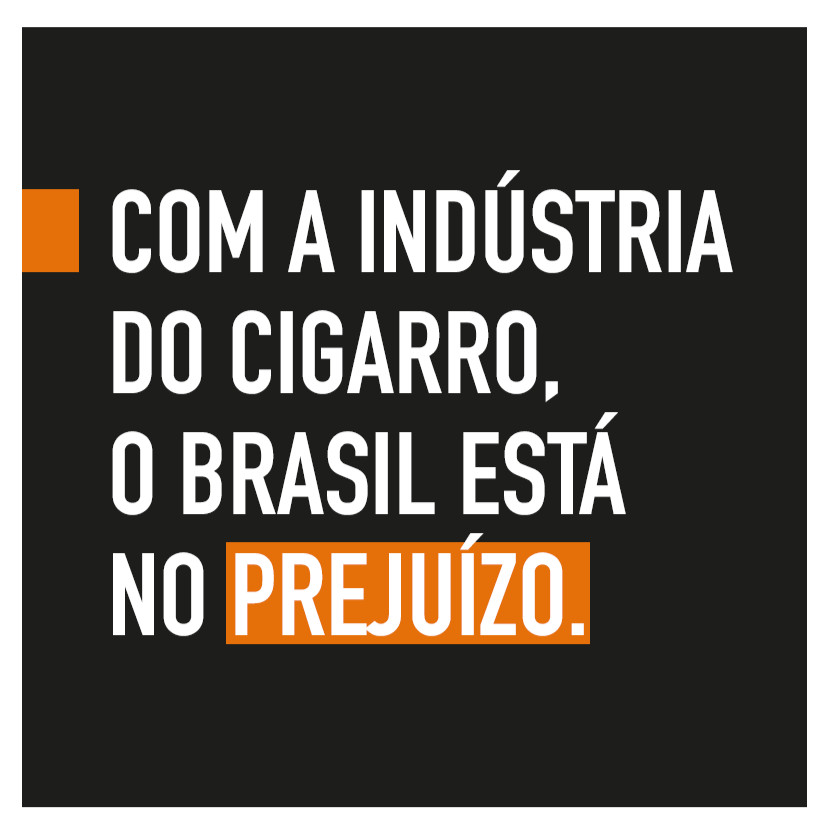monitorACT | Edition 18
12.07.23ACT Promoção da Saúde

Editorial
A journalist is scheduled to cover Groundhog Day, a traditional event that marks the end of winter in a freezing region of the United States. If the animal leaves its burrow, a period of less cold begins. Otherwise, winter goes on for a while longer. This arrogant and intractable journalist for some reason gets stuck on this day and its events, which are repeated endlessly. This is the story of the movie Groundhog Day, a hit from the 1990s, whose title became an expression to say that things repeat themselves.
As we approach a possible change in the taxation of products that are harmful to health and to the environment, with a tax reform that may include a new way of taxing alcoholic beverages, tobacco products and ultra-processed foods, old arguments resurface, in a kind of a homage to Groundhog Day. Voices against public health measures leave their burrows and are raised along with strategies used for decades, since when tobacco control policies entered the countries’ agendas. At that time, they boasted that there would be economic chaos, a devastated land scenario, and even freedom of speech was used as an argument. Nowadays, these strategies are more sophisticated, but remain essentially the same. Their aim is to spread fear, turn the lobby wheel around and hinder public health progress, keeping the companies that manufacture harmful products with their extensive market shares and little regulation.
In Conflicts of interest and FGV studies, the opening article of this edition of Monitor ACT, Bruna Hassan, Mariana Pinho and Vitória Moraes show a strategy that has been used for decades in the tobacco sector: researchers with no qualification in the health area, manipulated studies, distorted data and dubious interpretations used to prove an argument that cannot be proved.
Mariana Pinho and Vitória Moraes also worked on the following article, Less tobacco, more food, which discusses the absurdity of us having a significant amount of the population living in hunger and food insecurity at the same time that an area equal to more than three times the city of Rio de Janeiro is used to grow tobacco.
Lastly, Laura Cury and our guest, Claudio Fernandes, show in The Empire of Drunkenness that it is necessary to raise taxes and improve regulations for alcoholic beverages, as they cause sickness and death and contribute to domestic violence and traffic accidents. However, to avoid losing consumers, they only present a good life with toasts and celebrations.
What does it take for us to leave this Groundhog Day?
Enjoy your reading,
Anna Monteiro
Communications Director
Conflicts of interest and FGV studies
By Bruna Hassan, Mariana Pinho and Vitória Moraes
Getúlio Vargas Foundation (FGV) published a study that states that physical inactivity, age and income is more relevant to obesity than the diet. Although it was published in 2022, the research is receiving attention from the media now. The list of news articles that mention it is extensive and includes some with a rather sensationalist approach that suggests that this is a discovery that will save the world from obesity - at Viva Bem (from UOL), Exame, Valor and Galileu (from O Globo), Veja, Portal Metrópoles, Diário de Pernambuco and even Agência Brasil. The authors of the study are Márcio Holland, Priscilla Albuquerque Tavares, José Maria Arruda de Andrade and Bruno Tebaldi. They are all experienced economic researchers and affiliated with the School of Economics of São Paulo from FGV, but none of them is a researcher from the areas of public health, epidemiology nor biomedics. Holland, the main author of the study, is a professor and coordinator of the Graduate Program in Finances and Economics at FGV. He was Secretary of Economic Policies at the Ministry of Finance during Dilma Rousseff’s government.
The research methodology actually has serious problems and the authors lack knowledge of the subject, since the scientific literature review is very weak. The literature review is an essential first step in any well-designed scientific research and would enable the authors to find evidence, which was not even mentioned in the report, on the role of ultra-processed foods and sugary drinks in the risk of weight gain, for instance.
It is known that the effect of physical activity in body fat loss is limited. A review on the subject, which analyzed whether an increase in physical activity would be able to reverse the obesity epidemic, found no evidence that adults that are more physically active gained less weight than those that are less active. Different exercise programs have already been tested in randomized clinical trials, which are far superior to cross-sectional studies, and the weight variation expected with the increase in physical activity was not observed. A study published in Nature Metabolism by the main researchers on the topic concluded that the obesity increase in the United States and Europe was likely not driven by a reduction in physical activity. In 30 years of analysis, in which almost 5,000 adults were followed, the basal energy expenditure decreased, even though the energy expenditure due to physical activity increased. In this study, it was used the method of doubly labeled water, which is the gold standard methodology for measuring energy consumption and is far superior to the estimates obtained in the FGV research through questionnaires.
If a risk factor for a disease is well established by studies of high methodological quality, as was the subject of FGV research, there is no reason to explore it further with studies of lower scientific quality. Nevertheless, that is what the authors did. They used data from two national surveys, the National Health Survey (Pesquisa Nacional de Saúde, from 2013 and 2019) and the Consumer Expenditure Survey (Pesquisa de Orçamentos Familiares, 2017-2018) - which are essential tools to assess the health and the expenditures of Brazilian people and define adequate public policies to face emerging issues, as well as to monitor and evaluate these policies, but neither of them are the kind of survey that should be picked to analyze a cause and effect relationship, a resource extrapolated by the authors. Every undergraduate in the health area who has taken introductory epidemiology classes knows this.
No study that evaluates a single moment in time, as these two surveys, can assess a relation between risk factors and weight gain or any other health outcome - for that, the people surveyed would need to be followed up over some period of time. The potential cause must happen before the effect. In surveys, it is not possible to know which came first, the chicken or the egg. Thus, we are not able to know if physical inactivity and inadequate food consumption caused obesity or if people living with obesity are doing less physical activity and maintaining an inadequate diet. Another problem related to the research project is that studies that compare more refined methods of assessing energy expenditure, food consumption and consumer expenditures through questionnaires show that people with obesity underreport food consumption more than people without obesity, which may attenuate the effect of associations.
There is one more issue: the research was published without proper peer review, which would require the evaluation by renowned researchers that study the same subject - a crucial step to consolidate scientific evidence. If this research were submitted to a serious scientific journal, it would hardly be approved, given the amount of errors and biases it presents. Finally, the last chapter of the report includes arguments and findings on alleged negative impacts of taxation to face obesity whose methodology could not be assessed. Some of these misconceptions are listed below:
“Furthermore, the current Brazilian tax system, with a traditional selectivity based on the goods essentiality included in the IPI, ICMS and even in the PIS and COFINS, already distinguishes the tax burden of natural and industrialized foods in a way that seems to be much more comprehensive and effective than the adoption of a unified taxation on consumption (as suggested by the OECD) combined with a tax as restrictive as the sin tax. Thus, the current Brazilian system seems to differentiate more comprehensively between natural and industrialized foods than the OECD standard.” page 98
“Thus, the creation of a 50% soda tax in Brazil would be added to the current tax burden on these products, which is 37% (that may reach 47% if we consider the entire market of soft drinks and “tubaína”) considering ICMS, IPI, PIS and COFINS on the retail price, that is, it could reach an effective burden of 87% or 97%, depending on the parameters used for the soda tax. This taxation level is much higher than international experiences, so the Brazilian debate seems to impose an additional taxation on products that are already taxed at a higher rate, compared to international experiences. Furthermore, as taxes on consumption already account for 50% of the overall tax burden in Brazil, additional taxation would make our tax system even more regressive, and the burden of public health spendings would fall on poor families.” page 98
“Comparing Tables 11 and 12, it is possible to see that, even if we take into account the complexity of taxes such as IPI and ICMS, there is a tax graduation in favor of healthy eating, unlike other international experiences. Table 12 shows that natural products are less taxed overall, which is important, even if it has little to do with the food energy in their composition” page 100
“In this sense, the sheer importation of international trends may cause apparently unexpected consequences, since Brazil already taxes industrialized foods with IPI, ICMS, PIS and COFINS, while natural foods do not tend to be taxed by IPI and have several exemptions. The mere adoption of international recommendations of a uniform taxation of the IBS type could potentially make natural foods more expensive and decrease the price of industrialized products, leaving the educational role only to an excessively restrictive tax, such as sugar-sweetened beverage taxation and its numerous exceptions.” page 101
The authors do not disclose the methodology used to calculate the tax burden on soft drinks and other foods, nor any technical comparison that demonstrates that Brazil’s tax burden is higher than other countries’. Moreover, international organizations do not discourage a high tax burden. The study published by ACT and FIPE, which was mentioned by the authors, simulates a 50% tax rate and forecasts good results regarding tax collection, GDP and jobs in Brazil. Contrary to the excerpts mentioned (and other excerpts that can be found below) and the findings of Tables 10, 11 and 12, the research produced by ACT in partnership with economists verified that the current tax system is unequal and favors the consumption of ultra-processed foods - the opposite of what was claimed by the authors of FGV’s research. More details can be found in the following studies:
FGV's analysis was used as an argument in a public hearing, held at the Chamber of Deputies to discuss alleged difficulties of the food sector with the Tax Reform, that took place two weeks after it was announced. João Dornellas, chief executive of the Brazilian Food Industry Association (Abia), that represents companies such as Nestlé and Danone, mentioned the publication and attacked the NOVA classification, discrediting the researchers who developed it and especially the term “ultra-processed”. Dornellas also claimed that selective taxation is an ineffective measure and affirmed that the industry should be part of the solution to the issue of obesity and NCDs.
Dornellas’ speech includes several strategies used by the manufacturers of unhealthy products to try to interfere with political processes and influence public opinion on matters of interest to the companies. Some of these strategies include using biased data and pseudoscience, performing attacks aimed at public health researchers and communities, overstating their contribution to the economy and blaming individuals for their health conditions. More details about these strategies can be found in the Big Food Dossier.
The research funding could not be verified. Journalists from O Joio e o Trigo tried to find out who sponsored the project, but FGV replied that “for contractual reasons, FGV does not reveal information about sponsorship and/or supporters of its research and studies.” However, it is possible to see that Holland has some degree of familiarity with the soda industry, as he is the main responsible for an article on sugar-sweetened beverage taxation and its impact in Brazil published in May, the same month in which the research on obesity was released. Besides, the economist has already defended the maintenance of Manaus Free Trade Zone through articles and a series of webinars, Diálogos Amazônicos, from FGV, for which Victor Bicca Neto, director of Coca-Cola Brazil and president of the Brazilian Association of Soft Drinks and Non-Alcoholic Beverages (Abir), was invited.
The wide dissemination of the study, along with the formation of coalitions with other industrial organizations in a decisive phase of the tax reform, demonstrates that the industry is using many tools to avoid more robust regulatory policies, thus achieving its goals and exempting itself from being held accountable for the harms caused by its products.
The tobacco control community faced a similar challenge when the Brazilian Health Regulatory Agency (Anvisa) banned the use of flavor additives in tobacco products and was criticized by tobacco companies. Sinditabaco, Abrasel, Fetag-RS, Stifa, Fetaesc and CNtur asked FGV to perform a socioeconomic analysis of the impacts of this measure on the tobacco sector
It should be noted that FGV is a renowned Brazilian institution in the areas of Public Policies, Management and Administration, and Economics and Finances. Even though their analysis was not explicitly developed to oppose Anvisa’s resolution, it predicted a catastrophic scenario for the tobacco production chain if the additives ban was to be implemented.
At the time, the analysis was widely disseminated and used by organizations linked to the sector, congressmen and renowned jurists in Brazil and in other countries, which were hired by the tobacco industry. However, analyses carried out by the Pan American Health Organization (PAHO), Johns Hopkins Bloomberg School of Public Health, Campaign for Tobacco-Free Kids and ACT and by researchers from University McGill (Canada), Lencucha and Pontes, showed that the methodologies of studies mentioned by FGV were not in accordance with scientific rigor - same as the current FGV study on obesity. Moreover, they noted that there were conflicts of interest, as they were produced by the tobacco industry and/or their allies - another reason for them to be questioned. Unlike the current study published by the entity, the analysis on the additives ban in Brazil had no author.
According to Lencucha and Pontes, the analysis published by FGV indicates a common industry strategy: distort information. “(...) through misrepresentations of legitimate sources and representations of illegitimate ones. The types of information used and the ways the information is represented does not provide a credible basis for the arguments. In this sense, the information is used as a rhetorical and strategic tool to create uncertainty and doubt.”
FGV is an entity of massive credibility. By publishing studies like these, without scientific rigor and peer review, with questionable methodologies and, in the case of the tobacco additives, being hired by a company directly interested on the subject, FGV ends up serving economic sectors of society and promotes misinformation and distortions that could potentially influence political processes and hinder progress in life-saving public health policies.
Less tobacco, more food
By Vitória Moraes and Mariana Pinho
The results of the last National Survey on Food Insecurity in the Context of the Covid-19 Pandemic in Brazil, produced and published by the Brazilian Network for Food Sovereignty and Food and Nutritional Security (Rede PENSSAN) in 2022, raised a red flag: there are 125 million people in Brazil living in some degree of food insecurity, with 33 million being hungry. Several factors contributed to this scenario, including the economic crisis that arose during the pandemic and the dismantling of important public policies and instruments to assure food security and sovereignty, such as the Food Acquisition Program and the National Council for Food Security (Consea), which were both restored in the new government. Nevertheless, hunger also demonstrates the country's inequalities, especially when we consider that social groups that are historically vulnerable, such as black women, people with low levels of education and residents of rural areas, are the most affected.
Hunger, especially in low- and middle-income countries, is the result of a global economic system with a hegemony of low diversity monocultures, since 66% of the agricultural crops produced include only nine species grown for food, especially soy, sugar cane and corn. Besides influencing food prices, supply and demand due to speculation in the financial market, commodities are used to manufacture ultra-processed foods, which are harmful to human health.
Tobacco farming is different than the food production system - 22,6% of the families that grow tobacco do not own any property and 63,9% own smallholdings ranging from one to 20 hectares -, but the effects produced by the tobacco production chain are similar to the ones caused by ultra-processed foods: illness, premature deaths and burdens for the economy, the people and the society. The production process is also harmful to the health of the growers and the environment. As if that were not enough, 38% of the households of small rural producers and family farmers face food insecurity in Brazil. Both production chains include a massive use of pesticides and precarious working conditions, which causes great socio-environmental issues, impact biomes and reduce biodiversity.
The ways to deal with hunger change depending on who is speaking. A study assessed the speech that supports the agroindustrial model and verified that it is unable to reach the root of the problem, as it is focused on technological development rather than community knowledge. This speech reinforces the idea that food production should be increased to end hunger, but it leaves aside other issues, such as land access and labor mechanization.
Experts, civil society organizations and traditional communities advocate for the appreciation of other ways to solve the global crisis, such as agroecology, a production system that considers collective well-being, ancestral knowledge, biodiversity and local cultures. The National Program of Diversification in Tobacco Growing Areas, launched in 2005, was in line with this proposal and had as principles sustainable development, food security, productive diversification and social participation. For years, it improved the production and development process in tobacco growing areas, as well as ecological production, by reducing the use of pesticides. An analysis commissioned by the Pan American Health Organization showed that, among the families that were part of the Program, around 70% wanted to diversify their production to increase income and improve their work security.
The National Articulation for Agroecology (Articulação Nacional pela Agroecologia - ANA) also advocates for the expansion of agroecological knowledge and production as a strategy to fight hunger and promote healthier, more sustainable environments and social justice. The reestablishment of the Ministry of Agrarian Development (MDA) and of important policies and instruments, such as the Food Acquisition Program (PAA), the National Supply Company (Conab) and the National Council for Food and Nutrition Security (Consea) itself, are important steps to face hunger. If the Diversification Program was also reestablished, it would reaffirm the commitment of the Brazilian government to safeguard families from tobacco growing and would also contribute to the fight against hunger. This message, supported by ACT, was approved as a motion by the Free Conference on Health and Agroecology, to be presented at the National Health Conference, and is included in a letter with more than 20 signatures sent to the MDA.

This was also the starting point of ACT’s campaign in World No Tobacco Day 2023, “Less Tobacco, More Food. Support the reestablishment of the Diversification Program” (click here to watch the campaign video). A technical note written by the economist Valter Palmieri Jr for the campaign notes that 350 thousand hectares are destined for tobacco growing in Brazil, the world’s third largest producer - the same area used to grow vegetables and equal to three cities of Rio de Janeiro. In China, the world’s largest producer, tobacco growing uses an area 2.7 times larger than the one used in Brazil, but the country’s ratio of land allocated for food production (vegetables, fruits and rice) and tobacco is 6 times higher than Brazil’s. Thus, we understand that the tobacco industry suffocates the production of healthy foods.
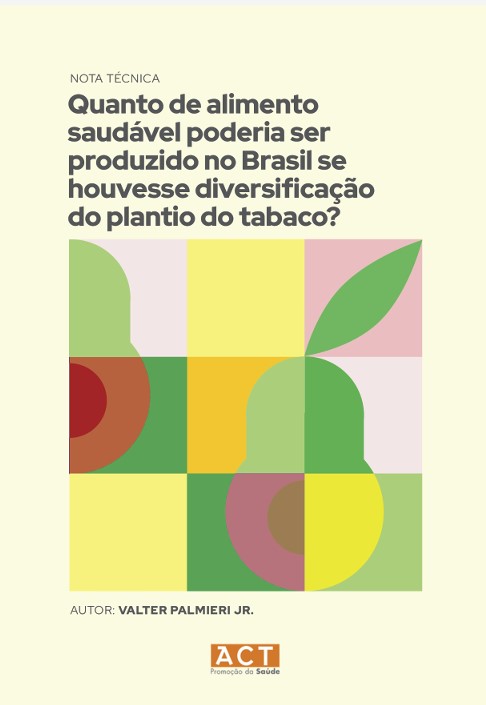
The Empire of Drunkenness
By Claudio Fernandes and Laura Cury
The abusive use of alcohol is a public health problem that affects millions of people worldwide, including in Brazil. Alcohol consumption is associated with several diseases, including liver diseases, hypertension, diabetes, depression and cancer, and it is also related to traffic accidents, intrapersonal and interpersonal violence and other dangerous behaviors. Raising prices is an effective way to reduce alcohol consumption, and this topic is being discussed in the current Tax Reform.
Besides health issues, there are also what have been called “commercial determinants of health”, according to the World Health Organization (WHO) and the World Bank, which are activities that encourage the consumption of certain products, even if they are harmful and cause negative effects to health, the environment and the society as a whole. The alcoholic beverages industry, for example, invests heavily in advertising, marketing and low prices to increase the sales and the consumption of their products that can lead to dependence, illness and even death, especially among young and more vulnerable people.
Several commercial and social determinants of health are discussed in the report “Alcohol Obstacle to Development”, published by the NGO Movendi International. The document analyzes alcohol consumption from its individual and psychological aspect, its powerful economic roots and its branches of oligopoly. It shows that the alcoholic beverages industry is a global empire with a huge financial and cultural capital that unquestionably influences the lives of billions of people worldwide.
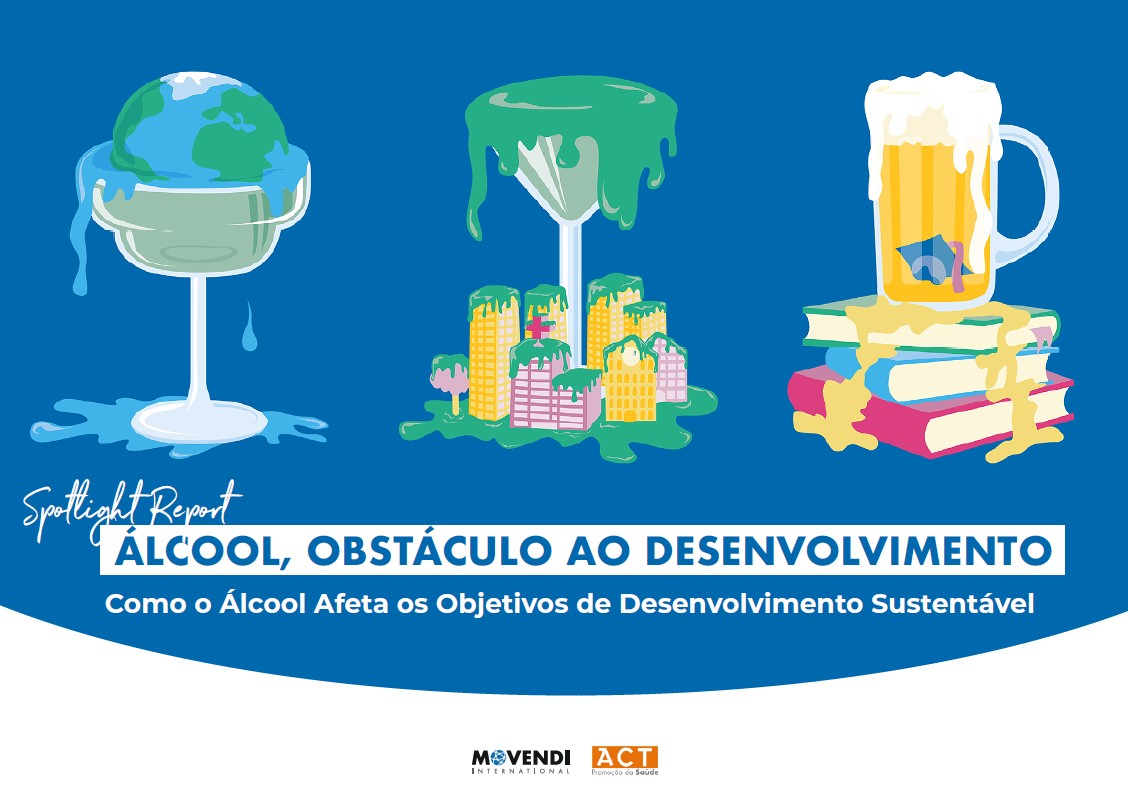
Even though the effects caused by alcohol in the human body have been known for thousands of years and new studies have associated it with other diseases, the industrial scale in which alcoholic beverages are produced and distributed adds a new and complicated dimension to the matter of their consumption. In our contemporary society, celebrating involves drunkenness. Socializing involves drunkenness. Sports sponsorships involve drunkenness, as does culture funding. What remains is the idea that happiness and achievements are directly associated with alcohol consumption. We are so used to it that attempts to regulate the sector are met with antipathy and irrational outbursts.
According to an analysis made by Vital Strategies with data from the Ministry of Health Mortality Information System, an increase in the consumption of alcoholic beverages during the pandemic in the city of São Paulo, for example, resulted in an increase of 150% in deaths caused by mental or behavioral disorders. The increase was 64.5% in the state and 18.4% in the country. The National Survey of School Health (PeNSE) from 2019, on its turn, found that almost half of the teenagers have already tried alcoholic beverages. It is important to notice that beers, “ice” drinks and other beverages with low alcohol content are not considered alcoholic beverages according to the law that regulates advertising and marketing of these products. As a result, they are exempted from any proper regulation in this regard.
Selective taxation is a step forward to reduce the abusive use of alcohol
Selective taxation on all kinds of alcoholic beverages is the most cost-effective measure to reduce the harmful use of alcohol, as proven by studies from the World Bank ratified by WHO. Implementing this policy would also raise resources that could be used in health treatment and prevention actions - an important pillar of sustainable development. At the time when Nísia Trindade, the Brazilian Minister of Health, is reinforcing the federal government commitment to the Sustainable Development Goals of the United Nations, selective taxes on alcohol are necessary to reaffirm this commitment. The ongoing discussions about the tax reform make it possible to implement concrete measures for that.
Before the claim that there would be unemployment in the industry returns, we must remember the productivity wasted by hangovers, illness, traffic accidents and violence and the thousands of deaths that could be avoided every year if alcohol consumption was reduced and more responsible. Thus, if the respect for this historic psychotropic substance is to be recovered, honesty and control, which can be promoted through increased taxation, are the appropriate path to maturity, both social and individual, on the path of sustainable development.
Monitor ACT
Proofreading and editing by Anna Monteiro
Graphic production by Ronieri Gomes
Monitoring team
Anna Monteiro
Bruna Hassan
Denise Simões
Fabiana Fregona
Laura Cury
Mariana Pinho
Marília Albiero
Victória Rabetim
Vitória Moraes
Guest author: Claudio Fernandes, Senior Economist, GT Agenda 2030

